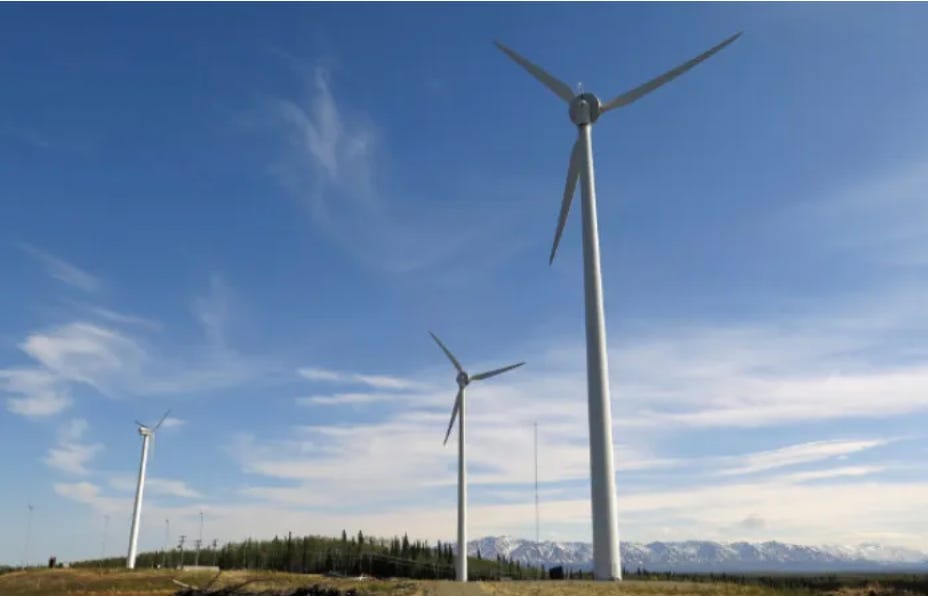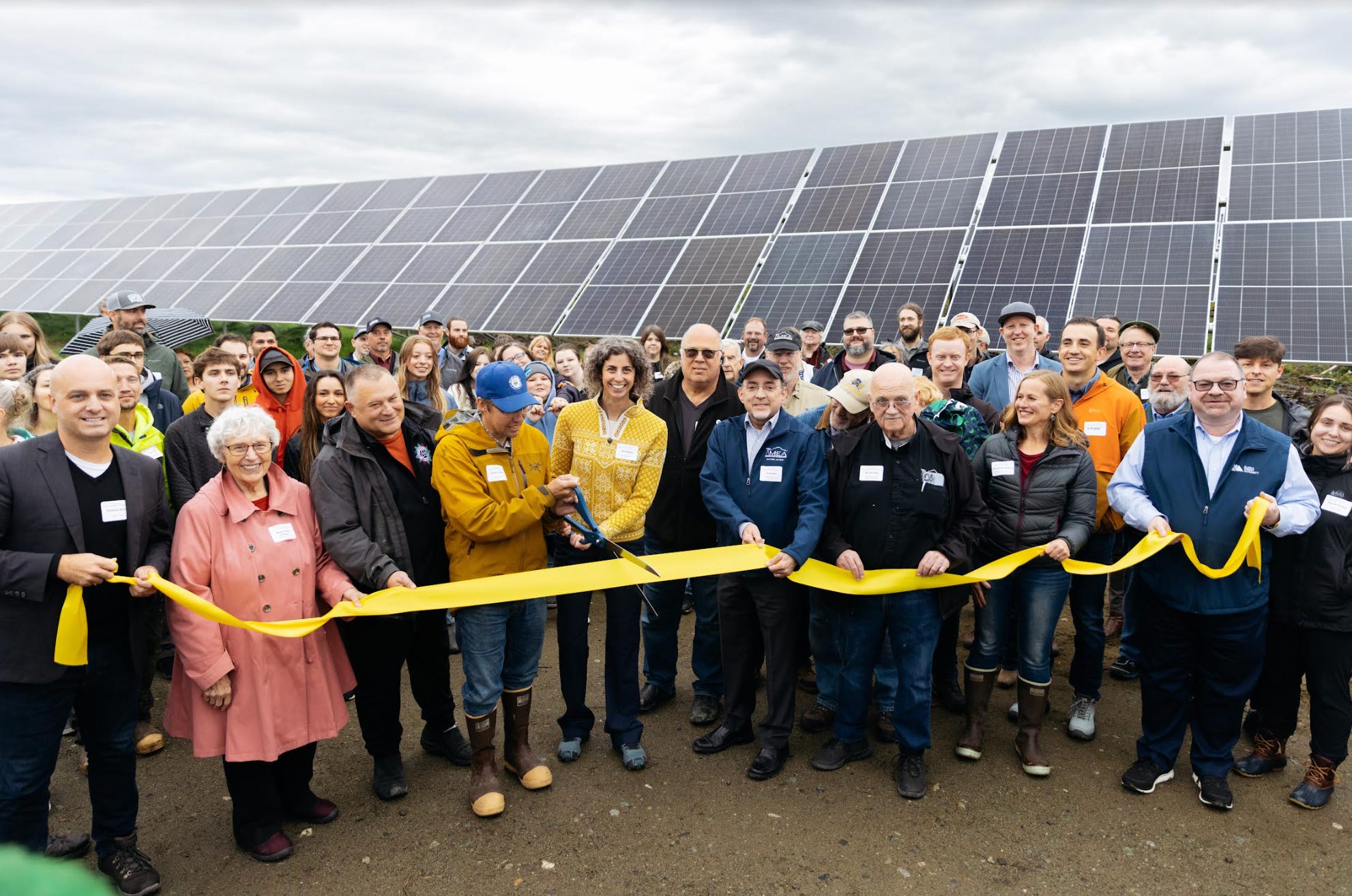Interesting stuff: natural gas incentives, a new pact on Indigenous language election materials and a possible corporate shakeup in Yakutat
Plus, read my attorneys' warning letter to the Alaska Industrial Development and Export Authority, or AIDEA, which has refused to fully process a basic public records request for more than two months.

The termination dust has arrived, and we’re decidedly out of the summer news doldrums and into the busy fall season for stories — which means it’s time for more Interesting Stuff.
This week’s edition has two energy-related items — one on a new federal study on renewable power in Alaska, and another on proposed tax breaks or other incentives to boost Anchorage-area natural gas production.
There are also new developments in a decade-old legal case related to Alaska’s compliance with the federal Voting Rights Act. And, in Yakutat, where residents have fought over the local Native village corporation’s logging business, a judge has ordered the corporation to hold an election for its entire board of directors after a three-year delay.
One other quick item: I hired a law firm, the Northern Justice Project, to send a warning letter to the Alaska Industrial Development and Export Authority, or AIDEA, which has refused to fully process a basic public records request for some of its contracts for more than two months. You can read the letter here; AIDEA has not yet responded.
As a reminder: This kind of work costs money. If you’re already a paid Northern Journal subscriber, thank you. If not, and you can afford it, please consider upgrading.
Federal researchers: renewables legislation wouldn’t significantly boost electricity costs
Requiring Alaska’s urban utilities to generate 80% of their electricity from renewable power by 2040 should not meaningfully raise prices for consumers over the lowest-cost scenario because renewables are already becoming cheaper than natural gas plants, a federal researcher told Anchorage utility leaders this week.
“The difference is about $2 million, or less than 1%,” Marty Schwarz, a power systems engineer with the National Renewable Energy Laboratory, or NREL, told a Chugach Electric Association board committee Wednesday. He added: “You can hardly tell the difference.”
Schwarz was presenting preliminary findings of a new, in-depth NREL study, paid for by the U.S. Department of Energy, that examines the potential costs of hitting the 80% renewables target, known as a renewable portfolio standard. Currently, Alaska’s urban utilities generate roughly 80% of their power from natural gas.
The authors found that if those utilities make decisions solely based on which projects are cheapest, they would end up generating 78% of their electricity from renewable sources by 2040 regardless of any requirements, Schwarz said.
NREL is still reviewing the findings with stakeholders, and they’re subject to change before the final report is released in December, Schwarz added, and NREL officials would not release a copy of Schwarz’s slide presentation.
Legislators and Alaska GOP Gov. Mike Dunleavy have proposed bills to adopt such standards in recent years. But the proposals have stalled amid skepticism and opposition from utility leaders and their allies that’s largely focused on the price of installing wind and solar projects, and of integrating them into Alaska’s electrical grid.

“If legislative direction raises the cost of energy by 20%, 30%, 40%, what does that do? That’s a lot of money taken out of the economy to pay electric bills,” Curtis Thayer, the head of the Alaska Energy Authority, said in an interview earlier this year. “Everybody agrees we need to go to renewables, but the cost factor is an issue.”
Schwarz told Chugach board members that as soon as 2027, "the cheapest wind (power) plant becomes cheaper than the lowest cost natural gas plant." By 2033, he added, almost all wind projects are projected to produce cheaper electricity than gas plants, driven by cost declines for wind energy and cost increases for natural gas.
The study does include the cost of some large-scale batteries that would be needed to store and manage the variable power produced by wind and solar projects, Schwarz said. It does not include specific devices that may be needed to integrate new renewable projects into the electrical grid, though Schwarz said those costs should be relatively small.
Alaska officials agree to new pact on Indigenous language translation for elections
Alaska elections officials have agreed to keep up their efforts to translate ballot and candidate information in the Indigenous Yup’ik language under a new pact with a group that successfully sued the state over violations of the federal Voting Rights Act in 2013.
U.S. District Court Judge Sharon Gleason last week approved the 37-page document that extends an agreement first struck in 2015 between state elections officials and Indigenous language speakers, who are represented by attorneys for the Native American Rights Fund.
Among the plaintiffs were two Yup’ik speakers and two tribal governments representing Gwich’in-speaking villages.
Gleason ruled a year after they filed their complaint that the state had violated Section 203 of the federal Voting Rights Act, which requires states to provide language assistance in elections to minority groups that meet specific standards based on census data. Gleason said Alaska had failed to provide candidate and ballot information to Yup’ik and Gwich’in speakers in three rural areas.
Since 2015, the two sides have avoided further litigation over Alaska’s translation obligations through what’s known as “stipulations” — negotiated agreements in which state elections officials set out what they’ll do to comply with the law.
The new stipulation approved last week extends the agreement through the end of 2026, with provisions for public service announcements, written and online translations of official election materials and efforts to hire bilingual poll workers in each village in the areas covered by the agreement.
It largely mirrors the previous stipulation that had been in effect, with a key distinction: Because of demographic changes, Section 203 no longer applies to Gwich’in translation, which was previously covered for a specific region of Interior Alaska, the Yukon-Koyukuk Census Area.
But the new stipulation says that the state will preserve existing translated Gwich’in materials and post them “to the extent practicable,” and re-hire bilingual poll workers “to the extent they are willing to serve.”
“We were glad that there will be at least some Gwich’in assistance available,” Megan Condon, a Native American Rights Fund attorney who worked on the agreement, said in an interview this week. “We were satisfied that the division was willing to make some voluntary efforts.”
Carol Beecher, the director of the Alaska Division of Elections, said that her agency has worked closely with Alaska Native speakers to provide accurately translated materials, “and we greatly appreciate the time and effort they have put into our language assistance program.”
“I’m glad we could meet with the plaintiffs and the Native American Rights Fund and agree to a short-term extension that updates the requirements for the division,” she said in a statement. “We’re hopeful that federal oversight will not be needed after 2026.”
Condon said it’s too early to say whether the plaintiffs will want to extend the agreement at that point, or let it expire.
“We share the common goal that the state would reach its obligations,” she said. “But I think it would be too early to say, for us, whether additional federal oversight will be necessary to ensure that those obligations are met.”
Tax breaks could be in the works for Cook Inlet gas producers
New tax breaks and other incentives to boost production of Southcentral Alaska’s dwindling natural gas supplies are likely to be on the agenda at the Capitol next year, according to officials from Alaska’s executive and legislative branches.
Facing an anticipated shortfall in the next several years, electric and heating utilities in Anchorage and its surroundings appear increasingly likely to import liquefied natural gas.
But government officials aren’t ready to give up yet on Cook Inlet, the aging basin that currently supplies Alaska’s urban utilities with natural gas for home heating and electricity generation.

Officials from Republican Gov. Mike Dunleavy’s administration have reviewed possible state incentive programs, like reduced taxes or royalties for Cook Inlet oil and gas companies, that could be proposed during next year’s legislative session, according to two of Dunleavy’s cabinet members.
The exact components of the proposal will be up to Dunleavy, they said.
“It’s fair to say that we will propose something,” John Boyle, the natural resources commissioner, said in an interview last week. “We’ll see what the governor’s office wants to do, ultimately.”
Sutton Republican Rep. George Rauscher will also file his own legislation to eliminate taxes and royalty payments for new Cook Inlet gas discoveries, he said in an interview. Rauscher is the vice chair of the House Resources Committee, which has jurisdiction over oil and gas policy, and he’s also a member of his chamber’s GOP-led majority.
While one member of the House’s mostly-Democratic minority, Anchorage Rep. Andy Josephson, said his caucus would be unlikely to oppose such proposals, Anchorage GOP Sen. Cathy Giessel, co-chair of her chamber’s resources committee, was less enthusiastic, saying she’d have to “look at the numbers.”
“I’m willing to discuss it,” she said, in reference to natural gas incentive proposals. But, she added, incentives won’t be a “silver bullet” that will solve Alaska’s gas supply crunch.
As logging feud drags on, judge orders Yakutat Native corporation election this month
A major event is scheduled to take place in the Southeast Alaska community of Yakutat later this month: the first election for the board of the local Native village corporation in three years.
Anchorage Superior Court Judge Laura Hartz last week ordered Yak-Tat Kwaan to hold a shareholder meeting on Sept. 23, granting a request by dissident shareholders who sued the village corporation earlier this year.
Those dissident shareholders are trying to take control of the corporation after it launched a controversial timber harvesting program through a subsidiary, Yak Timber, that’s since filed for bankruptcy.
Yak-Tat Kwaan’s last board election was in 2020. Elections are typically held annually, but board members postponed the 2021 shareholder meeting just before votes were set to be counted, citing “misinformation” on social media.
No election has been held since. Now, all nine of the corporation’s board members are up for re-election, and the dissident shareholders say they’re fielding candidates for every seat.
The group is focused on making sure that shareholders representing at least half of the corporation’s ownership return their voting paperwork, known as proxies — a requirement for the Sept. 23 meeting to go forward.
“We’ve got volunteers in Anchorage, in Juneau, in Washington, in Oregon who are all ready to pick up and hand-carry proxies to Yakutat that day, if needed,” Amanda Bremner, a leader of the dissident shareholders’ coalition, said in an interview.
Yak-Tat Kwaan’s timber subsidiary has indicated that it’s considering harvesting timber later this fall on a barrier island just offshore from Yakutat, over sharp objections from many residents and shareholders.
If the incumbent board stays in place, the dissident shareholder group plans to hold a nonviolent direct action training the day after the meeting — with a focus on opposing future logging efforts by the corporation. The training would be held in collaboration with Native Movement, the Indigenous-led advocacy group.
The corporation’s current leadership is pleased that the election is happening, though it wanted the date to be scheduled for November, after moose hunting season, said Shari Jensen, Yak-Tat Kwaan’s chief executive and an incumbent board member.
In an email, Jensen added that the order gave the corporation “less than a week” to invite participation from candidates for the board.
“We believe that the meeting on Sept. 23 constitutes a denial of the right of all of our shareholders to meaningfully participate in corporate democracy,” she said. “What is normally a seven- to eight-week process to hold an annual meeting became barely a three-week process.
Northern Journal is a reader-supported publication. To receive new posts and support my work, consider becoming a free or paid subscriber.



